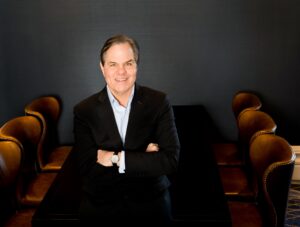
Marc A. White Jr., president and CEO of Ethic, a Wealth Bank. Photo by Kerry Brett | Courtesy of ETHIC
When Marc White Jr. joined Admirals Bank as president and CEO in 2017, he wanted to reconstruct the bank and move forward in a different direction.
For White, moving forward meant, in part, looking to the past.
“Old–fashioned relationships, I felt very strongly, were being lost in the process of people focusing more and more on technology to replace the human element, the human touch,” White said. “I felt very strongly that clients were not being served the way that I felt that they should be.”
Admirals Bank’s new business model looks to serve clients – specifically high and ultra-high net worth families – by offering wealth management and banking services with a focus on building relationships. This business model comes with a new name as well. Admirals Bank relaunched in January as Ethic, a Wealth Bank.
The Boston-based bank, which also has an office in Rhode Island, enters a crowded field of firms catering to the wealthy. Even with this competition, White said, Ethic’s approach could make a difference for wealthy individuals.
A High-Tech Personal Touch
Admirals Bank has faced significant hurdles since 2017, when it reported more than $19 million in losses and saw former CEO Nicholas Lazares leave his post. Also in 2017, Admirals became subject to a federal consent order and saw a plan fall apart to sell off most of the bank’s assets to a group of private bankers, including White.
White, who then joined Admirals Bank in 2017 as president and CEO, has worked in the Boston’s financial services industry for more than 35 years.
Ethic is trying to take advantage of an opening White sees in the wealth management landscape.
High net worth clients gravitate towards firms that offer a personal touch, the ability to personalize how they interact with a firm’s services and high standards of client service, all things White said some large wealth management services don’t do well. At the same time, families traditionally need to turn to big financial institutions for the ability to invest in vehicles more complex than index funds and other passive investments.
“I felt that if you could really address both of those elements, you could still get access to really good investment management capability but combine that with old-fashioned personal touch and truly understanding relationships.”
— Marc White, president and CEO, Ethic, a Wealth Bank
Nonetheless, White saw some people choosing smaller wealth management firms so they could work with advisers they knew and trusted. Ethic hopes to offer these clients the best of both worlds.
“I felt that if you could really address both of those elements, you could still get access to really good investment management capability but combine that with old-fashioned personal touch and truly understanding relationships,” White said. “There was a need for that type of financial institution.”
While the old-fashioned personal touch is key to Ethic’s approach, the wealth management capabilities will include innovative technology.
Because Admirals was a small bank, White said, it did not have legacy systems that would take years to upgrade. Instead, the bank has built a new technology platform that integrates banking, lending and wealth management in one system. The platform is up and running, including its banking, commercial lending, mortgage and wealth management services, with additional enhancements coming in the second and third quarters.
A Crowded Field
As it launches as a wealth bank, Ethic will face competition from traditional wealth management providers as well as from community banks in New England. Several of these banks are also making moves to expand wealth management services.
Amesbury-based Boston Private announced a goal last year to grow wealth assets under management to $50 billion. Two banks with wealth management services, Cambridge Trust and Wellesley Bank, recently announced plans to merge, a move that will give the former access to the latter’s wealthy MetroWest territory.
Alex Twerdahl, a managing director and senior research analyst at Piper Sandler, said wealth management is a natural extension of a bank’s services. He said a number of community banks in the Northeast have wealth divisions, with services ranging from retirement planning to tax and individual wealth strategies.

Ethic hopes to stand out in a crowded field of wealth management firms and banks by offering investment capabilities only larger firms traditionally have, with the service of a small office.
“When you have someone coming in to talk about their financial situation and you have wealth services, you should have an advantage in being able to talk about the overall financial picture,” Twerdahl said.
Wealth management does not require banks to keep as much capital on hand and is governed by fewer regulations compared to other banking and lending services.
Because fees are tied to assets under management, these services can do well during periods of strong market performance, like the current one. Twerdahl said this also provides banks with some insulation during low interest rate environments and periods of interest rate volatility.
Growth, he said, is often driven by the ability to hire wealth managers and their existing books of business away from other institutions.
“So much of [wealth management] is driven by the relationships,” Twerdahl said. “If you hire somebody who has good relationships with wealthier individuals, you’re going to be able to grow the business.”
Target is 50 Percent Growth
Ethic has started adding staff, and there will be opportunities to build relationships with the wealthy in Massachusetts. The state Department of Revenue recently released the 2017 report of taxpayers with income over $1 million. The state had more than 18,000 taxpayers in this category, and another 2,200 out-of-state taxpayers with Massachusetts income over $1 million.
While Ethic has a federal charter, White said it plans to start off by focusing on Greater Boston and the New England region. The bank has about $220 million in assets and just under 500 customers remaining from Admirals Bank.

Diane McLauglin
White’s goals include growing the loan book and deposit base by about 50 percent in 2020. On the wealth management side, he’s looking for Admirals to hit about $400 million to $500 million in assets under management by the end of the year. Assets under management are not included in total assets.
While Ethic’s customers will have high and ultra-high net worths, White said the institution plans to make itself available to the broader community by developing financial programming.
“Some of those folks may never be a client,” White said. “But if we can make a difference or have an impact or help them along the way, I feel very strongly that as an institution in 2020, we have an obligation to do that.”




 |
| 